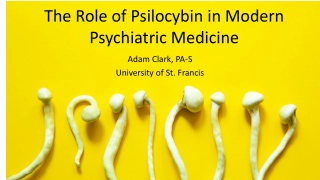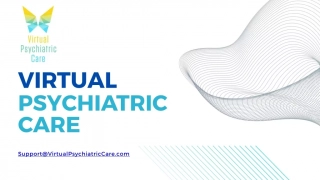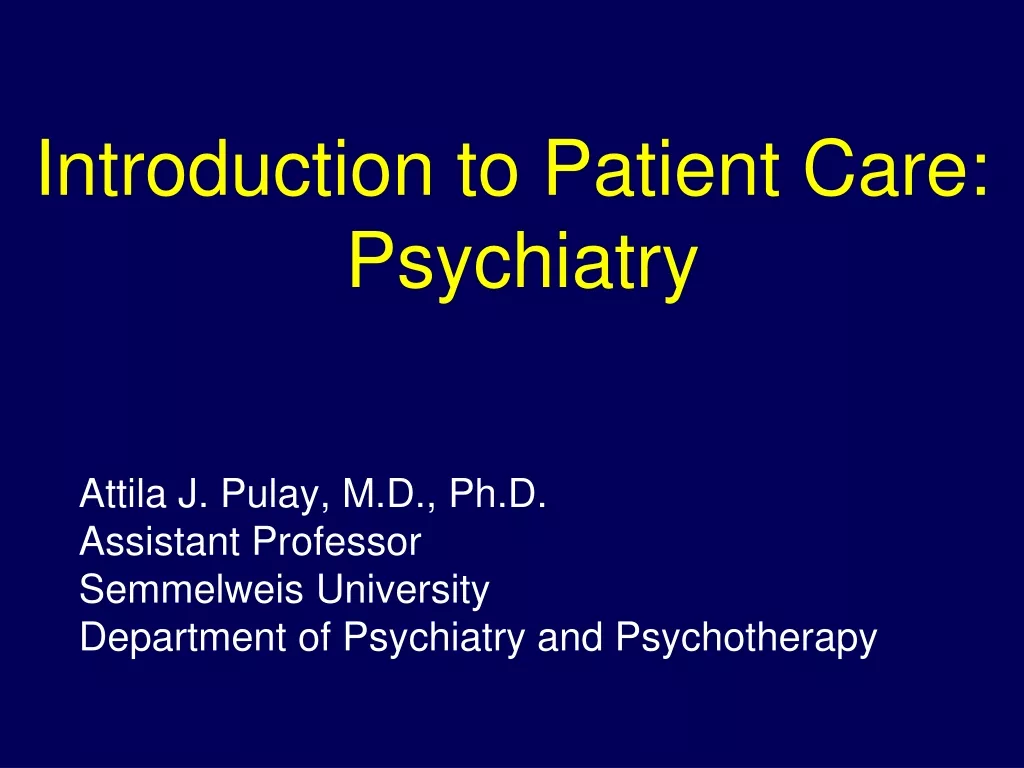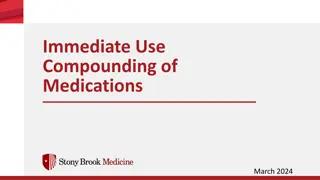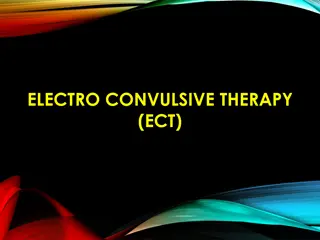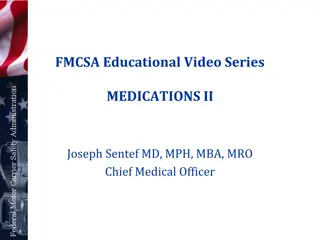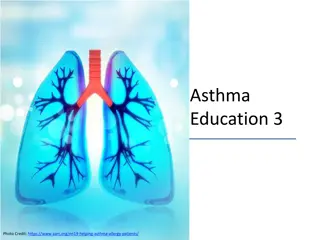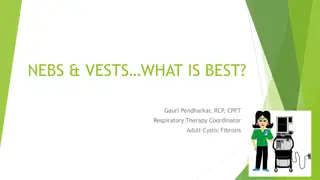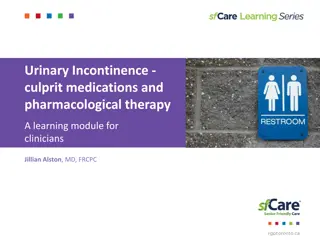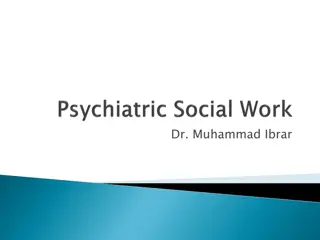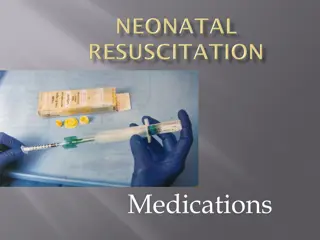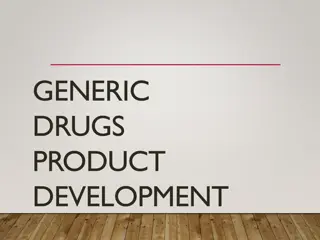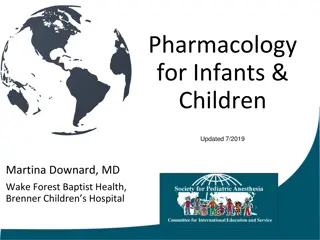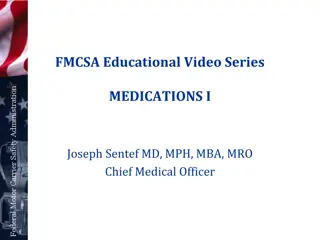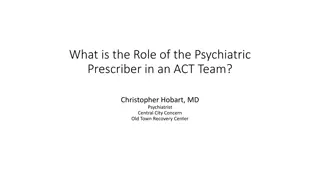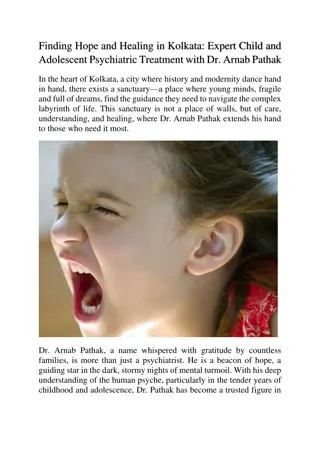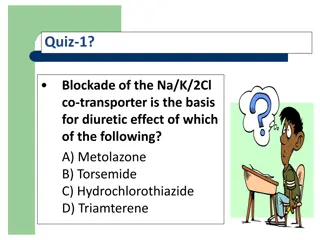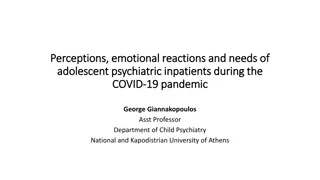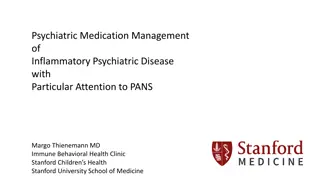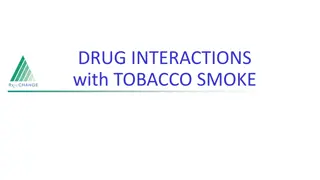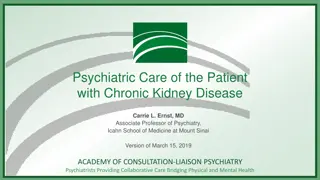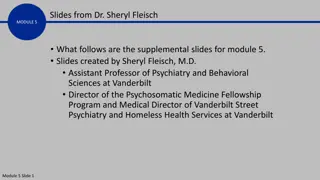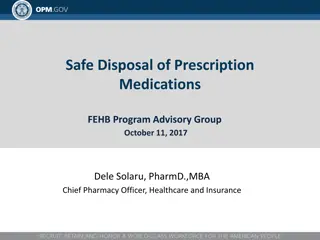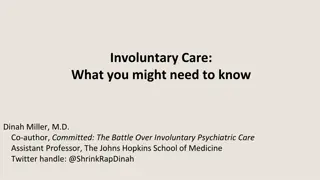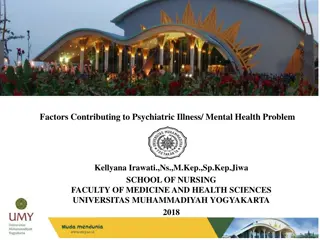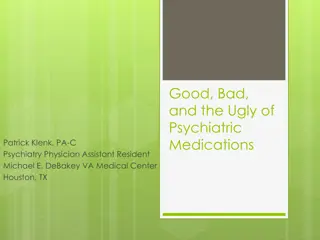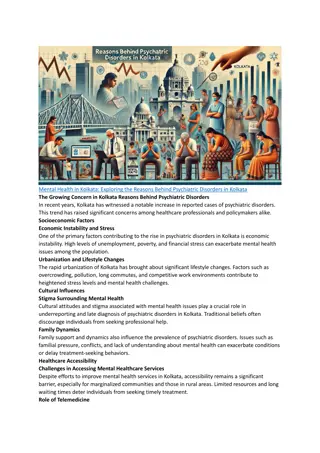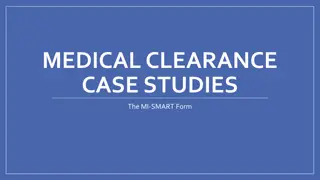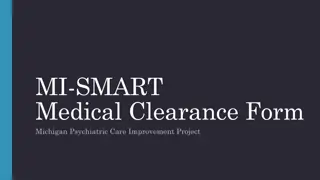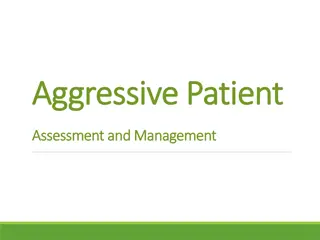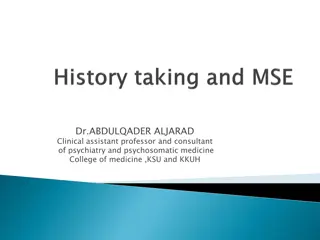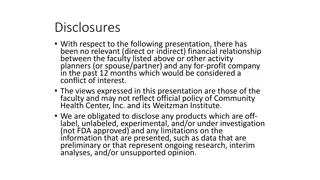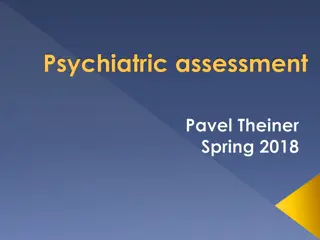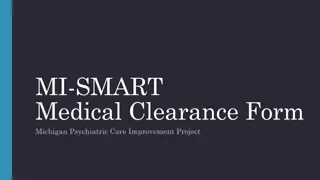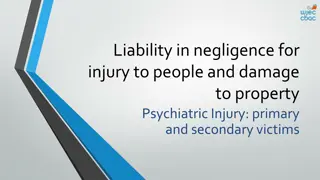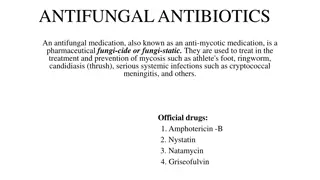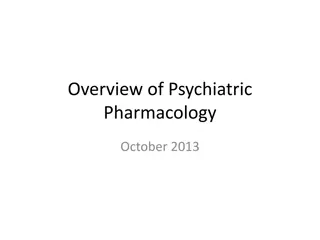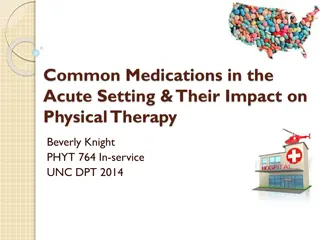The Role of Psilocybin in Modern Psychiatric Medicine
The use of psilocybin, a compound found in psychedelic mushrooms, in modern psychiatric medicine. It covers its traditional use, global distribution, early studies, and current areas of research in depression, tobacco cessation, terminal illness, and more.
1 views • 30 slides
Psychiatric Medical Management | Virtualpsychiatriccare.com
Experience compassionate and convenient psychiatric medical management with Virtualpsychiatriccare.com. Improve your mental health from the comfort of your own home.
4 views • 7 slides
Evolution of Psychiatry: A Historical Journey through Time
Psychiatry, a field blending clinical practice, biology, and social sciences, has ancient roots dating back to Graeco-Roman philosophers like Plato and Hippocrates. Significant historical milestones include the body humor hypothesis, the first mental health ward, and the emergence of psychiatric asy
2 views • 49 slides
Immediate Use Compounding of Medications - Guidelines and Procedures
Immediate Use Compounding of Medications involves preparing sterile medications outside the pharmacy in urgent situations to avoid delays in patient care. This process requires following specific criteria, maintaining aseptic technique, and ensuring proper labeling. It excludes acts like reconstitut
0 views • 13 slides
Understanding Electroconvulsive Therapy (ECT) for Psychiatric Treatment
Electroconvulsive Therapy (ECT), also known as electroshock, is a psychiatric treatment that induces seizures in anesthetized patients for therapeutic purposes. ECT has a controversial history but is well-established in the medical field. Introduced in 1938, ECT has replaced older treatments like in
1 views • 17 slides
Understanding Medications and Their Effects in DOT Driver Exams
This educational video series, presented by Dr. Joseph Sentef, Chief Medical Officer, covers medications commonly encountered during DOT driver exams. It addresses a range of medications like antipsychotics, antidepressives, and bipolar drugs, discussing their side effects, interactions, and appropr
0 views • 32 slides
Understanding Asthma Medications: Maintenance vs. Rescue
Asthma, a chronic condition, can be managed with two main forms of medications - maintenance and rescue. Maintenance medications are taken daily to prevent symptoms, while rescue medications are used as needed during asthma flares. Overusing rescue medications can reduce their effectiveness, so it's
0 views • 16 slides
Optimizing Respiratory Therapy for Adult Cystic Fibrosis Patients
Creating an effective daily respiratory therapy regimen is crucial for adults with Cystic Fibrosis (CF) to maintain healthy lungs and good lung function. This includes inhaled medications such as nebulizer treatments and bronchodilators, airway clearance techniques like the Vest and Pep devices, as
0 views • 32 slides
Understanding Medications and Pharmacological Therapy for Urinary Incontinence
This learning module for clinicians discusses the physiology of bladder control, age-related changes in the genitourinary system, medications that contribute to urinary incontinence, pharmacological treatments for UI, side effects of medications used for UI, and a senior-friendly approach to optimiz
0 views • 30 slides
Evolution of Psychiatric Social Work: History and Impact
Psychiatric social work is a specialized field that integrates social work principles with psychiatry to address emotional and mental health disorders. Originating in the early 1900s, it has evolved to provide crucial support to individuals struggling with mental health challenges, facilitating thei
1 views • 15 slides
Neonatal Medication Administration and Resuscitation Overview
Neonatal resuscitation may involve administering medications like epinephrine and volume expanders in specific situations such as hypovolemic shock. Before giving medications, ensure proper ventilation and compressions. Epinephrine helps with coronary artery perfusion and oxygen delivery, while volu
1 views • 15 slides
Understanding Generic Drugs and Brand Name Medications
Generic drugs are identical copies of brand-name medications in dosage, strength, quality, and intended use. They contain the same active ingredients but are sold under their chemical name. This article explores the basic differences between generic and brand-name drugs, when generic drugs are marke
0 views • 20 slides
Pediatric Pharmacology Update: Perioperative Medications in Infants and Children
Gain insights on frequently used medications in the perioperative period for infants and children, including anesthesia medications. Explore pharmacokinetics, drug distribution in neonates, and the effects of common anesthesia agents on pediatric patients. Understand how immature kidney or liver fun
0 views • 43 slides
Understanding the Intersection of Cardiology and Psychiatry: Review and Updates
This comprehensive review delves into the correlation between cardiac health and psychiatric medications, focusing on the QT and QTc intervals, antidepressants, antipsychotics, and cardiotoxicity associated with certain medications. It also explores the impact of depression on heart disease, risk fa
1 views • 47 slides
FMCSA Educational Video Series - Medications I by Joseph Sentef, MD, MPH, MBA, MRO
This educational video series covers various medications commonly encountered by medical examiners during DOT driver exams. It addresses medications such as amphetamines, benzodiazepines, opioids, and more, discussing their side effects, drug interactions, and regulations related to driver qualifica
0 views • 37 slides
Role of Psychiatric Prescriber in an ACT Team
The role of the psychiatric prescriber in an ACT team involves actively participating in team processes, attending meetings, assessing symptoms, providing medication education, conducting therapy, and home visits. They have clinical supervisory responsibilities, provide clinical supervision, monitor
0 views • 22 slides
Expert Child and Adolescent Psychiatric Treatment in Kolkata Dr Arnab@9804509480
Dr. Arnab Pathak is an expert of child and adolescent psychiatric treatment in Kolkata. For Book a consultation WhatsApp now at 91-9804509480. Child Adolescent Psychiatric Concerns. Empowering Young Minds: Expert Child and Adolescent Psychiatric Tr
1 views • 3 slides
Diuretic Mechanisms and Medications: Quiz Questions and Answers
Explore a series of quiz questions focusing on diuretic medications, their mechanisms of action, and clinical scenarios. Topics include the diuretic effects of specific medications, management of idiopathic hypercalciuria, drug interactions in elderly patients, effects of loop diuretics on ionic exc
0 views • 10 slides
Perceptions and Needs of Adolescent Psychiatric Inpatients During COVID-19 Pandemic
This study explores the perceptions, emotional reactions, and needs of adolescent psychiatric inpatients amidst the COVID-19 pandemic. Through individual interviews, themes such as knowledge about the pandemic, changes in routine, feelings, positive behaviors, and social support were examined. Parti
0 views • 26 slides
Management of Inflammatory Psychiatric Disease with Focus on PANS in Pediatric Patient
Dr. Margo Thienemann discusses the psychiatric medication management of a 10-year-old boy with inflammatory psychiatric disease, particularly focusing on Pediatric Acute-onset Neuropsychiatric Syndrome (PANS). The patient presented with various symptoms including compulsions, mood swings, OCD, oppos
0 views • 45 slides
Interactions of Tobacco Smoke with Medications: Effects and Recommendations
Drug interactions with tobacco smoke can impact the pharmacokinetics and pharmacodynamics of various medications. Tobacco smoke constituents can induce enzymes that affect the metabolism of drugs, leading to altered therapeutic responses. For example, CYP1A2 enzyme induction by tobacco smoke can dec
0 views • 6 slides
Psychiatric Care of Patients with Chronic Kidney Disease
This resource delves into the psychiatric care aspects of patients with chronic kidney disease (CKD), detailing symptoms, staging, common psychiatric disorders, pharmacokinetic changes, and renal adverse effects of psychotropic medications. It also presents facts about CKD prevalence in the US, stag
0 views • 26 slides
Understanding Psychiatric Challenges in Homeless Populations
This module sheds light on the prevalence of psychiatric disorders among homeless individuals compared to non-homeless, emphasizing issues like suicidal ideation and attempts. It also highlights the lack of psychiatry-specific training in addressing homelessness, and the potential benefits of street
0 views • 15 slides
Safe Disposal of Prescription Medications: Importance and Methods
Proper disposal of prescription medications is crucial to prevent harm to children, pets, and the environment. Safely dispose of unused medications to avoid accidental poisoning, misuse, and pollution of water sources. Methods include using authorized collectors, pharmacies, and take-back events, an
0 views • 5 slides
Understanding the Battle Over Involuntary Psychiatric Care
Explore the complexities surrounding involuntary psychiatric care, including standards for commitment, patient rights, and differing perspectives from organizations like The Treatment Advocacy Center, NAMI, and The American Psychiatric Association.
0 views • 38 slides
Factors Contributing to Psychiatric Illness and Mental Health Issues
Factors contributing to psychiatric illness and mental health problems include predisposing factors such as psychological and biological factors, as well as precipitating stressors like challenging stimuli. Mental health is defined as a state of well-being involving happiness, contentment, and effec
0 views • 15 slides
Understanding Psychiatric Medications: The Good, The Bad, and The Ugly
Delve into the complexities of psychiatric medications with a focus on the benefits, risks, and side effects associated with antidepressants, mood stabilizers, antipsychotics, and anxiolytics. Learn about common lab monitoring needs, drug interactions to watch for, and important considerations when
0 views • 36 slides
Exploring Reasons Behind Psychiatric Disorders in Kolkata
Mental Health in Kolkata: Exploring the Reasons Behind Psychiatric Disorders in Kolkata. The Growing Concern in Kolkata Reasons Behind Psychiatric Disorders. In recent years, Kolkata has witnessed a notable increase in reported cases of psychiatric d
0 views • 3 slides
Understanding Medical Clearance in Psychiatric Cases - Case Studies
In these case studies, patients with psychiatric conditions require inpatient psychiatric care. The Medical Stability Screen helps determine if further work-up or documentation is needed. A 23-year-old male with schizophrenia is medically stable with no additional work-up required (Green), while a 4
0 views • 10 slides
Michigan Psychiatric Care Improvement Project Overview
Michigan Psychiatric Care Improvement Project (MPCIP) is implementing crisis system improvements to enhance patient care and streamline care coordination. The project focuses on medical clearance, psychiatric bed registry, crisis hotline, and more. MDHHS and its partners aim to determine medical cau
0 views • 42 slides
Understanding Agitation and Aggression in Psychiatric Patients
Agitation is a tension state characterized by anxiety and hyperactivity seen in depression, schizophrenia, and mania, while aggression involves hostile thoughts or actions towards others, common in impulse control disorders. Psychiatric patients are usually not aggressive, but certain mental illness
0 views • 16 slides
Comprehensive Approach to Psychiatric Diagnosis and Patient Assessment
Dr. Abdulqader Aljarad, a clinical assistant professor and consultant of psychiatry, emphasizes the importance of obtaining necessary information, establishing rapport with patients, and understanding their circumstances to make an accurate diagnosis. The process involves putting patients at ease, s
0 views • 32 slides
Psychiatric Evaluation Process Insights
This presentation provides valuable insights into conducting psychiatric evaluations, including tips on referrals, team processes, interview techniques, and obtaining usable data. The speakers emphasize the importance of thorough preparation, flexibility, and understanding individual nuances during
0 views • 35 slides
Comprehensive Guide to Psychiatric Assessment Techniques
This detailed resource covers various aspects of psychiatric assessment including general overview, clinical interview techniques, patient meeting strategies, applying interviewing techniques, reflecting patient feelings, and summarizing patient thoughts. The content emphasizes the importance of a d
0 views • 44 slides
Overview of Classification of Psychiatric Disorders
Psychiatric disorders are illnesses with various manifestations that impact functioning due to disturbances in biological, social, genetic, and other factors. Two key classification systems, ICD-10 and DSM-5, categorize over 200 types of psychiatric illnesses. The ICD-10 includes categories like org
0 views • 18 slides
Overview of Michigan Psychiatric Care Improvement Project
Michigan Psychiatric Care Improvement Project (MPCIP) aims to enhance crisis system improvements through initiatives such as medical clearance algorithm, psychiatric bed registry, and crisis helpline. The project involves collaborations with healthcare associations and community partners, focusing o
0 views • 42 slides
Understanding Liability in Negligence for Psychiatric Injury: Primary and Secondary Victims
Psychiatric damage resulting from negligence involves injury to the mind rather than the body, requiring claimants to prove recognized psychiatric injury with medical evidence. Primary victims suffer physical or foreseeable physical and psychiatric injuries, while secondary victims experience psychi
0 views • 23 slides
Overview of Antifungal Antibiotics and Their Uses
Antifungal antibiotics are crucial medications used to treat and prevent various fungal infections such as athlete's foot, ringworm, candidiasis, and systemic infections like cryptococcal meningitis. This article discusses key antifungal medications including Amphotericin-B, Nystatin, Natamycin, and
0 views • 6 slides
Overview of Psychiatric Pharmacology: A Comprehensive Guide from 2013
This presentation delves into the nuances of psychiatric pharmacology, exploring common psychiatric conditions, historical perspectives on medical treatments, categories of psychiatric medications, and principles of treatment. It also touches on mental illness definitions from DSM-IV-TR and DSM-V, a
0 views • 27 slides
Medications in Acute Care: Impact on Physical Therapy
Side effects of medications in the acute setting can manifest as impairments in various body systems, including integumentary, musculoskeletal, cardiovascular/pulmonary, and neuromuscular systems. Factors influencing adverse drug events include pharmacokinetics, drug interactions, and patient-specif
0 views • 24 slides
